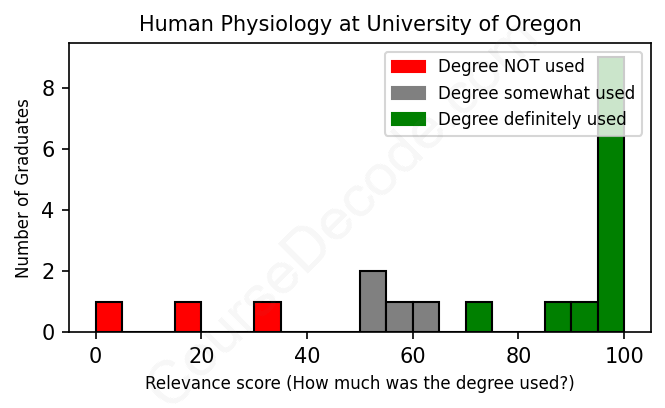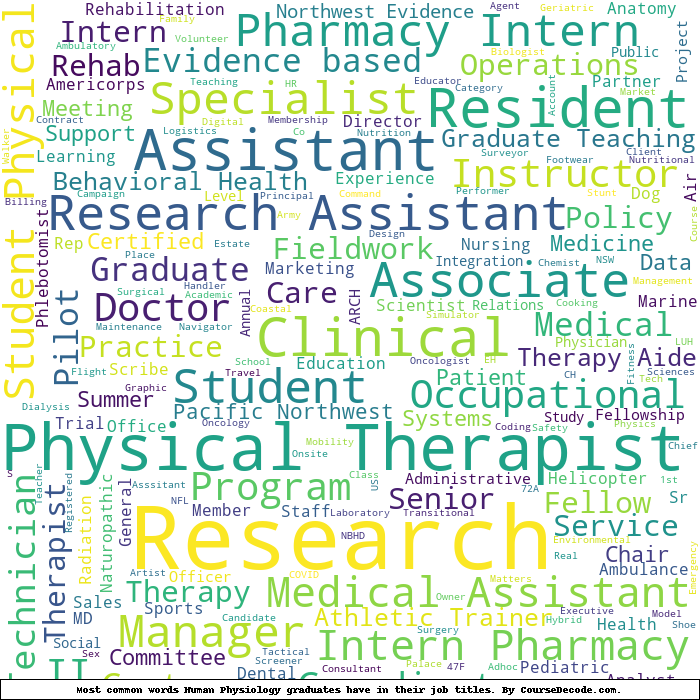
First, some facts. Of the Human Physiology graduates from University of Oregon we've analyzed , here's how many have used (or NOT used) their degree in their career:

These are estimates based on AI analysis of 19 LinkedIn profiles (see below).
The verdict? Above average. Overall, with an average relevance score of 74%, Human Physiology graduates from University of Oregon have a higher likelihood (+7%) of finding work in this field compared to the average graduate across all fields:
And for comparison, here's the chart for all profiles we've looked at across all degrees.
Also, after graduating, 63% of these graduates have pursued further education other than another Bachelor's degree (such as a Masters degree or other), compared to the average across all profiles of 35%. This suggests you may need more than just a Bachelors degree to be competitive as a Human Physiology graduate.
See the details:
|
Relevance score: 100% We think this person has gone into a career highly relevant to their degree. We think this person has gone into a career highly relevant to their degree.
DEGREE INFOGraduated in 2010 from University of Oregon with a Bachelors Degree in Human Physiology. Also pursued further education since (see below). JOB HISTORY SINCE GRADUATIONClinical Education Experience HealthSouth Rehabilitation, Slocum Center for Orthopedics, Honor Healthcare & Total Sports Therapy Aug 2014 - Jul 2015 Physical Therapist  Ideal Physical Therapy Aug 2015 - Feb 2016 Physical Therapist  Select Medical Feb 2016 - Jan 2017 Physical Therapist  Life Care Centers of America Feb 2016 - Jan 2017 Contract Physical Therapist  HonorHealth Jun 2016 - Jan 2017 Travel Physical Therapist  Fusion Medical Staffing Mar 2016 - Present FURTHER DEGREES DONE SINCE GRADUATINGDoctoral of Physical TherapyAT Still University 2012 - 2015 ABOUTI am confident that as part of the allied health professional team I instill a strong set of skills in regards to: leadership, interpersonal communication, time management and work ethics. I believe in always striving for delivering the highest quality of care with superior patient outcomes. |
The top 10 most common jobs done by the graduates we've analyzed (ranked most common to least) are:
When looking into the job paths of graduates with a degree in Human Physiology from the University of Oregon, it's clear that many have found their way into health-related fields, especially in physical therapy and athletic training. A significant number of them work as Physical Therapists, which directly applies their understanding of human anatomy and physiology to help patients recover from injuries. Roles such as those at Ideal Physical Therapy and Life Care Centers require using specific skills learned during their studies, making these positions highly relevant. Similarly, jobs as Athletic Trainers show a direct connection to their education, as they need to understand body mechanics and injury prevention. This trend highlights the strong alignment between these career choices and the knowledge gained in their Human Physiology programs.
However, not all graduates have pursued careers closely related to their field of study. A surprising number have ventured into roles like marketing, banking, and even excavation, which don’t effectively utilize their background in physiology. For instance, jobs at Nike in operations or customer service lack any direct connection to the medical or health sciences. Additionally, positions in human resources or administrative roles tend not to require the specialized knowledge they gained during their degree. Overall, while many graduates effectively leverage their education in health-related careers, there’s a notable chance for others to drift into less relevant fields, which can dilute the perceived value of their degree a bit. So, if you're eyeing a career in health or sports medicine, a Human Physiology degree indeed provides a solid foundation; just be mindful of where the journey may lead you!
Here is a visual representation of the most common words in job titles for Human Physiology graduates (this is across all Human Physiology graduates we've analyzed, not just those who went to University of Oregon):

When you look at the career trajectories of folks from the University of Oregon who studied Human Physiology, there's definitely a mix of paths that people take. For many graduates, their first jobs after college often relate very closely to health and rehabilitation. Roles in physical therapy seem to pop up frequently, especially for those who graduated around 2010 to 2015. Many started as physical therapists, research assistants in health settings, or other clinical roles, which shows a solid connection to the core of what they studied. It's clear that a lot of these graduates are moving into health careers that are very relevant, which is awesome for anyone considering this major!
Looking down the line a bit—like five or ten years after graduation—we see a trend where some of these individuals really climbed the ladder in their respective fields. Many have landed positions in well-respected organizations or have advanced into roles like physical therapy specialists, physician assistants, or even in higher research positions in health sciences. However, it's not all rosy; there are some graduates who ended up veering off into unrelated fields, like banking or other operational roles. So while there are definitely successful careers tied closely to human physiology, there's also a handful of people who seem to have drifted away from the core of their studies into broader or less relevant areas. Overall, if you're thinking about studying Human Physiology, you should know that it's got a lot of potential to lead to meaningful careers, especially in health and wellness! Just be prepared for the fact that not everyone sticks directly to that path.
A Bachelor’s degree in Human Physiology can be a bit challenging, but it really depends on your strengths and interests. If you enjoy science, especially biology and chemistry, and you're good at tackling complex concepts, you might find it manageable. However, if those aren't your strong suits, be prepared for some tough courses. Overall, it’s about average difficulty compared to other science degrees; you’ll be doing a fair amount of studying and keeping up with lab work. It will require dedication and effort, but if you're passionate about the subject, it can also be really rewarding!
Most commonly, in the LinkedIn profiles we've looked at, it takes people 4 years to finish a Bachelor degree in Human Physiology.
Looking at these University of Oregon grads, it seems like some of them have made decent money, while others may be a bit more on the struggle bus. For instance, the Physical Therapists and those in management roles at places like Nike are probably pulling in solid salaries, which is great because healthcare and athletic sectors usually pay well. However, roles like "Dog Walker" and "Fieldwork Occupational Therapy Student" suggest that not everyone is cashing in big time just yet. Many have taken lots of internships or entry-level positions right out of school, which can mean lower pay at first. Overall, there’s a mix of earnings among them, but those who went into healthcare or solid corporate jobs seem to be doing better financially than others just starting out in their careers.
Here is a visual representation of the most common words seen in the "about" section of LinkedIn profiles who have a Bachelor degree in Human Physiology (this is across all Human Physiology graduates we've analyzed, not just those who went to University of Oregon). This may or may not be useful:

Here are all colleges offering a Bachelor degree in Human Physiology (ordered by the average relevance score of their Human Physiology graduates, best to worst) where we have analyzed at least 10 of their graduates:
| College | Score | Count |
|---|---|---|
 University of Iowa University of Iowa
|
88 | 10 |
 Boston University Boston University
|
80 | 20 |
 University of Oregon University of Oregon
|
74 | 19 |